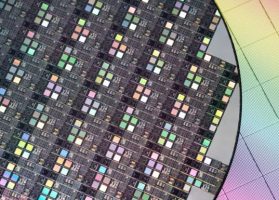South Korea Passes Its ‘Chips Act’ Amid US-China Friction
2023年3月30日

South Korea’s parliament easily approved a bill Thursday to boost the country’s powerhouse semiconductor industry by giving firms tax breaks to spur investments.
The legislation known as the “K-Chips Act” would increase the tax credit to 15% from the current 8% for major companies investing in manufacturing facilities, while smaller and medium size firms would see the tax break go to 25%, up from the 16% now. The measure is expected to boost domestic investment for South Korean tech companies such as Samsung Electronics Co. and SK Hynix Inc.
The act had backing from lawmakers in the conservative and progressive camps, with 179 members voting in favor and 13 opposed. Nearly 40 lawmakers at parliament chose to forfeit their vote, while nearly 70 did not take part in the ballot. The president has indicated he will approve the bill.
To prop up the economy and stand out in the global race for tech supremacy, President Yoon Suk Yeol in mid-March announced a $422 billion investment into key areas such as chips and electric vehicles, including plans for hubs housing chipmaking plants.
With the new parliament bill and government incentives, South Korea is hoping to maintain its global semiconductor technology leadership or even overtake Taiwan when it comes to the business of making logic chips for others.
The tech sector is a major driver of South Korea’s trade-reliant economy, accounting for about 12% of total exports last month. With global semiconductor demand in a slump, the economy contracted in the final three months of 2022, and the current quarter also looks challenging as exports fall further.
Samsung and Hynix are the world’s two largest memory chipmakers, while Samsung is the world’s second-largest contract manufacturer for logic chips by market share, lagging Taiwan Semiconductor Manufacturing Co. Memory chips, which store data, are relatively simple and are traded like commodities. Logic chips, which run programs and act as the brains of a device, are more complex and expensive.
South Korea’s parliament easily approved a bill Thursday to boost the country’s powerhouse semiconductor industry by giving firms tax breaks to spur investments.
The legislation known as the “K-Chips Act” would increase the tax credit to 15% from the current 8% for major companies investing in manufacturing facilities, while smaller and medium size firms would see the tax break go to 25%, up from the 16% now. The measure is expected to boost domestic investment for South Korean tech companies such as Samsung Electronics Co. and SK Hynix Inc.
The act had backing from lawmakers in the conservative and progressive camps, with 179 members voting in favor and 13 opposed. Nearly 40 lawmakers at parliament chose to forfeit their vote, while nearly 70 did not take part in the ballot. The president has indicated he will approve the bill.
To prop up the economy and stand out in the global race for tech supremacy, President Yoon Suk Yeol in mid-March announced a $422 billion investment into key areas such as chips and electric vehicles, including plans for hubs housing chipmaking plants.
With the new parliament bill and government incentives, South Korea is hoping to maintain its global semiconductor technology leadership or even overtake Taiwan when it comes to the business of making logic chips for others.
The tech sector is a major driver of South Korea’s trade-reliant economy, accounting for about 12% of total exports last month. With global semiconductor demand in a slump, the economy contracted in the final three months of 2022, and the current quarter also looks challenging as exports fall further.
Samsung and Hynix are the world’s two largest memory chipmakers, while Samsung is the world’s second-largest contract manufacturer for logic chips by market share, lagging Taiwan Semiconductor Manufacturing Co. Memory chips, which store data, are relatively simple and are traded like commodities. Logic chips, which run programs and act as the brains of a device, are more complex and expensive.
Source:South Korea Passes Its ‘Chips Act’ Amid US-China Friction – Bloomberg

